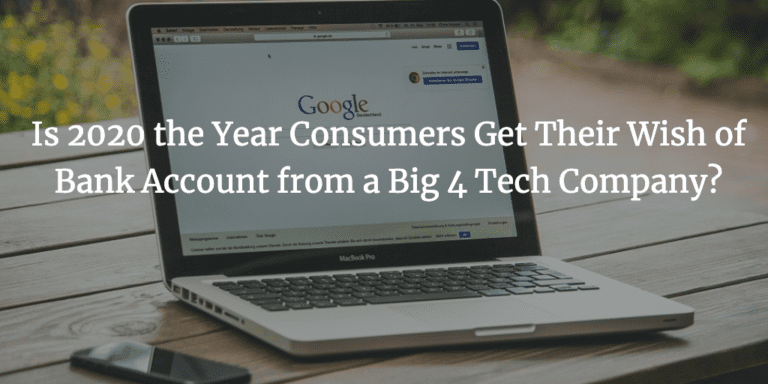
The idea of Apple, Google, Amazon or Facebook getting into banking is not new. The possibility has been discussed for years with little to no information coming from the actual tech companies on when or if an offering would ever come to fruition. So far we’ve only seen ancillary products like the Apple Card, Google Pay or Amazon lending to their merchants.
American Banker recently reported that 64% of American adults would consider buying or applying for financial products from a tech company as opposed to a traditional bank or credit union. The Harris Poll, which surveyed 2,100 people found that users are willing to make the move despite reservations about information sharing at the companies. It is interesting that Americans have less trust for the tech companies and are concerned that they are not up front about how they use personal information, but potentially want to feed them with more data. In addition, 69% believe that tech companies are more likely to have a data breach than a traditional financial institution. It seems incredible the trade-offs some are willing to make, but points to just how unhappy some might be with their current providers.
What people are most interested in is a convenient product embedded with technology, something we would expect from any of the big tech companies today. The data skews as you would expect, with younger generations more likely to be interested in banking with a tech company, but still in the age range of 55-64, 52% said they would move to a tech company. Six of ten people noted that they’d be willing to allow tech companies to use their spending data if it meant they would get better service like better security, protection against fraud or other rewards.
The data included in the survey brings up the question of whether most consumers are simply tired of their traditional bank or if they are just accustomed to big tech serving them well in so many other aspects of their lives. As a millennial and someone familiar with all of the fintech offerings in the market today, I’d argue there is also a big gap of awareness of existing providers. Many would be better served by exploring some of the new offerings in the market today. I am less bullish on any initial offering from big tech being more compelling than what some other fintechs offer today.
A handful of fintechs have had massive success attracting users to their product, but banking relationships tend to be very sticky. I have experienced this firsthand. Having opened both accounts at Ally and Marcus, I still have multiple traditional bank accounts, one of which I first opened in high school. These old accounts are temporary storage for paychecks until I allocate funds elsewhere. Ron Shevlin recently called checking accounts “paycheck motels”. Shevlin argues that the checking account needs to be reimagined and from my perspective a simple checking account from any of the names in big tech simply isn’t compelling enough. Still, the mass marketing that would come from a launch may still benefit many since it is likely to be a better user experience than what many traditional banks offer.
So where do we stand today? Amazon was reportedly in talks back in 2018 with JP Morgan Chase on offering a checking account, but we have yet to see any further news. Late last year the Wall Street Journal reported that Google will soon offer checking accounts with their project with the code-name “Cache”. The partnership was rumored to be with Citi and a credit union at Stanford University. It will be interesting to see if the Google checking account reaches the market in 2020 as originally reported. With so many users already in the ecosystem of big tech firms I have no doubt that massive amounts of people will sign up for the first account offered. The digital banking space is already extremely competitive with big names continuing to launch in the US so it will be fascinating to see how it all plays out.


